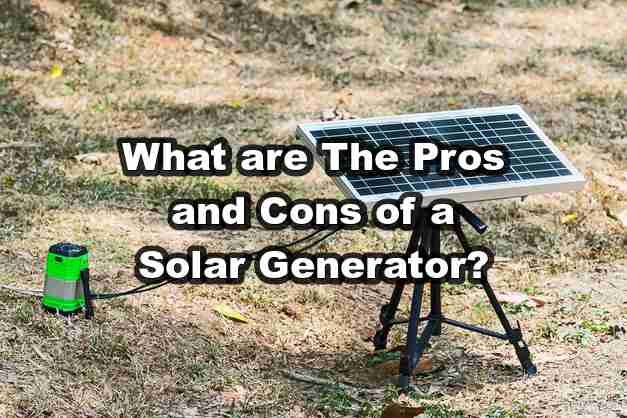Solar generators have emerged as a powerful alternative to traditional fuel-powered generators, harnessing the sun’s energy to provide portable and backup power solutions. These innovative devices combine solar panels, batteries, and inverters to capture, store, and convert solar energy into usable electricity.
Whether you’re considering one for emergency preparedness, outdoor adventures, or reducing your carbon footprint, understanding both the advantages and limitations is essential before making an investment.
Solar generators offer numerous benefits including zero emissions, silent operation, and minimal maintenance requirements. They eliminate the need for fossil fuels, reducing both your carbon footprint and ongoing operational costs. Unlike gas generators that require regular engine maintenance, solar generators have few moving parts, resulting in greater reliability and longevity.
However, solar generators also come with certain drawbacks such as weather dependency, higher upfront costs, and power limitations. Their charging efficiency depends on available sunlight, and they typically provide less power output than traditional generators of similar size.
Understanding these trade-offs is crucial for making an informed decision that aligns with your specific needs.
For a comprehensive overview of solar power solutions, visit our solar generator category page.
Key Takeaways
- Solar generators provide clean, renewable energy with zero emissions and no fuel costs after initial investment.
- They operate silently with minimal maintenance requirements due to having no moving parts.
- Higher upfront costs ($500-$5,000+) are balanced by lower long-term operating expenses.
- Power output is limited by battery capacity and recharging depends on available sunlight.
- Solar generators excel for small to medium power needs (phones, laptops, small appliances) but may not be suitable for powering entire homes.
Advantages
Environmental Benefits
Solar generators represent a significant step forward in clean energy technology. Unlike traditional generators, they produce zero emissions during operation, making them an environmentally responsible choice. The absence of fuel storage requirements reduces environmental risks and eliminates the need for potentially hazardous fuel storage.
Operational Benefits
One of the most appreciated features of solar generators is their silent operation. This characteristic makes them ideal for various settings where noise could be problematic, such as camping sites or residential areas. The lack of moving parts results in minimal maintenance requirements, lowering long-term costs and increasing reliability.
Our guide on whether a solar generator can power a house provides detailed insights for those wondering about compatibility with home power systems.
Practical Advantages
Modern solar generators offer remarkable portability and versatility. Their design typically incorporates multiple output options, including standard AC outlets, USB ports, and DC connections, making them compatible with a wide range of devices. With proper care, these units can last 10+ years, providing reliable service throughout their lifespan.
Disadvantages
Performance Limitations
Weather dependency remains one of the primary challenges for solar generators. Cloud cover, seasonal changes, and daylight hours can significantly impact charging efficiency. Understanding these limitations is crucial. For more details, explore our comparison of solar generators and solar batteries.
Cost Considerations
The initial investment in a solar generator typically exceeds that of traditional fuel-powered alternatives. This cost includes not only the generator unit but often requires additional equipment such as solar panels and charging accessories. However, the absence of fuel costs can offset this investment over time.
Technical Constraints
Battery degradation presents a long-term consideration, as all battery systems lose capacity over time. Additionally, the relationship between size and power output means that larger units are necessary for higher power requirements. For technical details about power conversion, read our article on the differences between solar generators and inverters.
Usage Considerations
Solar generators excel in specific applications while being less suitable for others. They prove ideal for:
Emergency Backup: Providing reliable power during outages without fuel concerns
Outdoor Activities: Supporting camping, RVing, and other recreational pursuits
Small Appliance Power: Running electronics, lights, and modest power tools
However, they may not be the best choice for:
Whole-house Power: Limited capacity compared to traditional generators
Industrial Applications: May not meet high continuous power demands
Heavy Equipment: Starting surge requirements might exceed capabilities
Making an Informed Decision
When considering a solar generator, evaluate your specific needs:
- Calculate your power requirements carefully
- Consider your typical usage environment
- Assess your budget constraints
- Compare alternative power solutions
- Factor in long-term operational costs
Conclusion
Solar generators represent a significant advancement in portable power technology, offering a clean alternative to traditional fuel-powered options. Their ability to harness free energy from the sun, coupled with silent operation and minimal maintenance requirements, makes them increasingly attractive for environmentally conscious consumers.
While the higher initial investment might seem daunting, the long-term savings from free solar energy and reduced maintenance costs often justify the expense. A quality solar generator might cost $1,000-$3,000 upfront, but eliminates ongoing fuel expenses that can amount to hundreds of dollars annually with traditional generators.
The technology continues to improve, with modern units featuring better efficiency, longer battery life, and more versatile charging options than ever before.
Solar generators excel in specific scenarios such as camping trips, outdoor events, and emergency backup for essential devices like medical equipment, refrigerators, and communication tools. They’re perfect for situations where noise is disruptive or emissions pose health concerns, such as indoor use during power outages.
Solar generators provide an excellent solution for those seeking reliable power for outdoor activities, emergency backup for essential devices, or an eco-friendly alternative to gas generators. However, it’s crucial to realistically assess your power needs and understand the limitations regarding recharge times and capacity before making your purchase.
With proper research and appropriate sizing, a solar generator can be a valuable addition to your power management strategy, providing peace of mind while reducing your environmental impact.

Leave a Reply